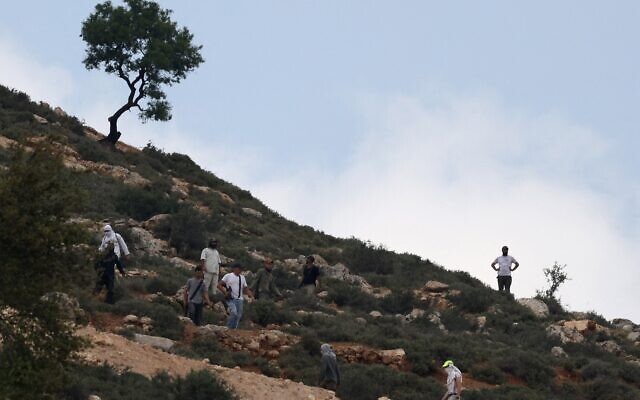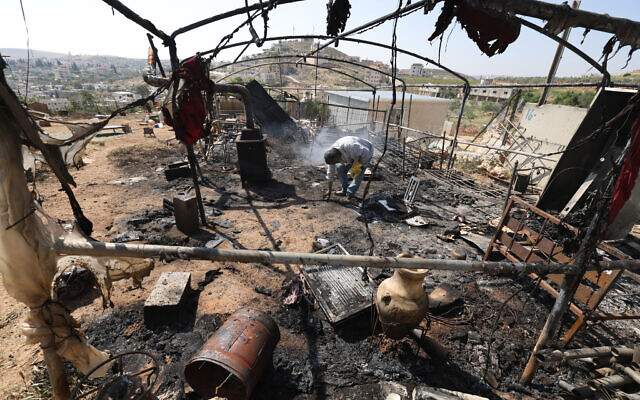BBC Gaza reporter: My struggle to keep family safe while covering the war
By Adnan El-Bursh,BBC Arabic

BBC
Adnan lived apart from his family for several weeks, visiting when he could
For about three months, Adnan El-Bursh reported on the war in Gaza while living in a tent, eating one meal a day, and struggling to keep his wife and five children safe. The BBC Arabic reporter shares the harrowing moments he faced covering a war that pushed him to his limits.
Warning: This report contains descriptions and images some readers may find distressing

One of the worst moments of the past six months was the night we all slept on the street. I looked at the faces of my wife and children, huddled in the bitter cold in Khan Younis in southern Gaza, and felt helpless.
My 19-year-old twins, Zakia and Batoul, lay on the pavement alongside my daughter, Yumna, who is 14, my son Mohamed, who is eight and my youngest girl, Razan, aged five, with their mother, Zaynab.
As we tried to rest outside the Palestinian Red Crescent Society's headquarters, the sounds of shelling echoed through the night and drones buzzed overhead.
We had managed to find an apartment to rent, but the landlord had called earlier that day, saying the Israeli military had warned him the building would be bombed. I was working at the time, but my family grabbed their bags and fled.
Adnan faced many difficult moments covering the war, including when 80 bodies were buried in a mass grave
We met up at the Red Crescent headquarters, which was already overflowing with displaced people.
My brother and I sat on cardboard boxes all night, discussing what we should do.
We had fled our homes in the town of Jabalia a few days earlier, on 13 October, leaving most of our possessions behind, after the Israeli military told everyone in northern Gaza to move south for safety.
And now we had just escaped being bombed in the area we had been told to move to. It was hard to think straight. I felt angry, humiliated and terrible that I could not provide any protection for my family.

Eventually, my family moved to an apartment in Nuseirat in central Gaza, while I stayed with the BBC team in a tent at Nasser hospital in Khan Younis. I visited every few days.
Communication was difficult, with internet and phone signals sometimes cut. Once I did not hear from my family for four or five days.
In Khan Younis, the BBC team - about seven of us - lived on one meal a day. Even when there was food, sometimes we did not eat it because there was hardly anywhere to go to the toilet.
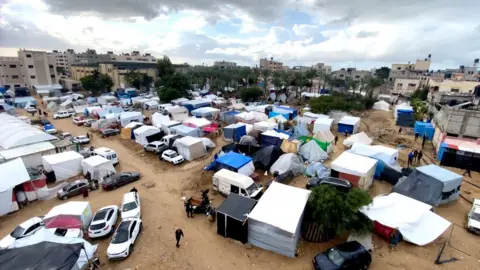
The BBC team worked from a tent in the grounds of Nasser Hospital in Khan Younis
During this time my friend, Al Jazeera bureau chief Wael Al-Dahdouh, suffered a terrible loss.
The house his family had been staying in was hit in an Israeli air strike. His wife, teenage son, seven-year-old daughter and one-year-old grandson were killed.
The Israeli military says it takes "feasible precautions" to reduce civilian casualties, and in this case had "targeted Hamas terrorist infrastructure in the area".
Reporting Gaza: My War
In Gaza, Palestinian journalists document the war as they live it on a daily basis. In this BBC World Service film, we hear the story of BBC Arabic's Reporter in Gaza, Adnan El-Bursh who found himself reporting the news, as he was living through it.
I watched the footage of my friend, who I have known for 20 years, embracing his children's shroud-wrapped bodies in central Gaza. I wished I was there with him.
The news came amid a string of reports about the deaths of other friends, relatives and neighbours. My heart ached. I have now lost about 200 people in the war.
That day I wept live on air, as I was reporting. In the night, I woke up with tears covering my cheeks. Wael's image never left my mind.
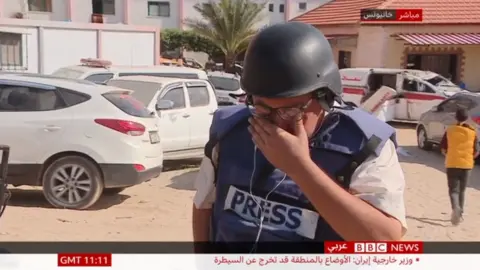
Adnan cried while reporting live the day his friend Wael Al-Dahdouh's family members were killed
I have covered conflicts in Gaza for 15 years, but this war stands apart, from the unprecedented attack that triggered it, to the scale of the losses.
At 06:15 on 7 October I was woken by loud explosions and my children screaming. I went up to the rooftop and saw rockets being launched towards Israel from Gaza.
When we realised Hamas had breached the fence into Israel - in its assault that saw about 1,200 people killed and 250 taken hostage - we knew the response from Israel would be like nothing we had seen before.
More than 34,000 people have now been killed in Gaza, according to the Hamas-run health ministry. The risk of injury and death has been ever-present.
Two days into the war, I hurried to our local market in Jabalia, to stock up with food. It was busy with others doing the same.
But the area was bombed heavily just 10 minutes after I left. The entire place was destroyed, including the large grocery store where I had shopped moments earlier.
I knew the faces of the shop owners. Many of them were among the dead.
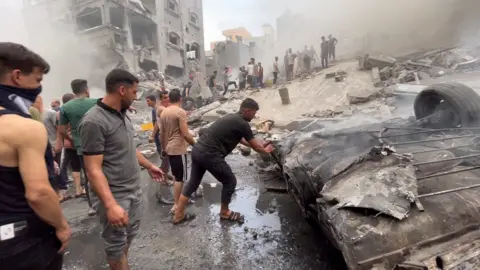
Adnan escaped the bombing of his local market in Jabalia by about 10 minutes
Amnesty International says at least 69 people were killed in the attack and that it should be investigated as a war crime.
The Israeli military has not responded to the BBC's question about this incident.
Throughout the war it has said its operation is targeting Hamas, which it says operates from civilian locations.
It also says "strikes on military targets are subject to relevant provisions of international law".
Before the war, Jabalia was a beautiful, tranquil town. I was born there and had been living a simple, contented life with my family, filled with love and plans for the future.
I had a farm east of the town, where I had planted olive, lemon, and orange trees with my own hands. It was peaceful and I loved to drink tea there after work.
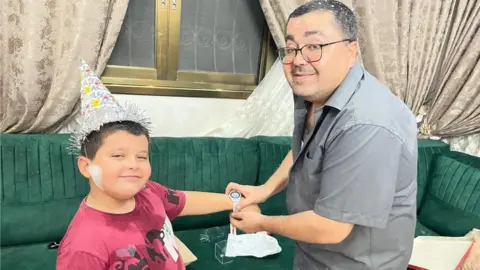
Adnan El-BurshAdnan and his family were living a contented life in Jabalia before the war - but their home is now destroyed
The day we decided to flee northern Gaza for Khan Younis - leaving our homes and the BBC office in Gaza City behind - was a pivotal moment in my life.
With more than 10 people crammed into one car, my family and I crawled our way south, along a single road, with tens of thousands of other people, on foot and in vehicles, all loaded with belongings.
The journey was punctuated by air strikes on nearby areas on both sides of the road. Confusion, grief and uncertainty marked the faces of my family and the crowds.
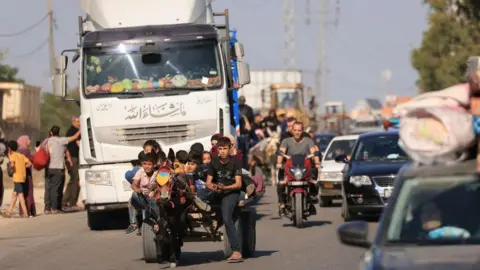
Tens of thousands of people fled northern Gaza after Israel ordered them to evacuated
The children kept asking me: "Where are we going? Will we be back tomorrow?"
I really wish I had taken our photo album, full of pictures of me as a young child, my parents, and my wife and I when we got engaged. My dad was an Arabic teacher and I also wish I had taken some of his books that I kept after he died.
Later, I learned from a neighbour that my house had been completely destroyed, and my farm burned.
After that terrifying and surreal journey south, and our night outside the Red Crescent headquarters, I continued working from Khan Younis for several weeks. My family were still in Nuseirat and being separated from them took a toll emotionally.
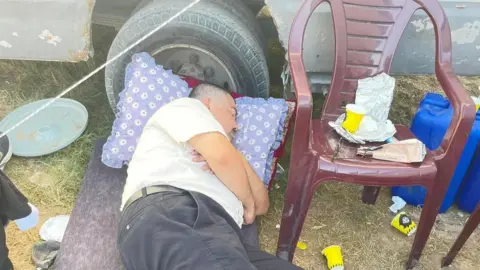
Conditions were difficult for the BBC team in Khan Younis - here Adnan grabs a moment to rest by the broadcast truck
Then, in early December, Israel began telling Gazans to leave parts of Khan Younis and move to other areas, including Rafah, further south.
The Israeli military also closed the main road leading north, which connected me and my family. I did not know how I would get to them or where we should go if I did. Rafah was already overcrowded with hundreds of thousands of people, and there was barely anywhere to stay.
For days, I grappled with swirling emotions. News circulated about Israeli forces advancing towards the main roads, apparently aiming to divide the south from the central and northern regions. I was terrified that I - or my family - would be killed and we would never see each other again.
For the first time I felt like I had lost it. I did not even know what day it was. I considered stopping work and returning to my family. If we died, we would die together.
In the end, on 11 December, I drove with a colleague along a back road to Nuseirat. When I arrived, my youngest children rushed up to hug me, with Razan reaching round my neck and holding on tight.
We managed to move the family to Rafah. The BBC team had also relocated there, continuing to report. There were some awful moments.
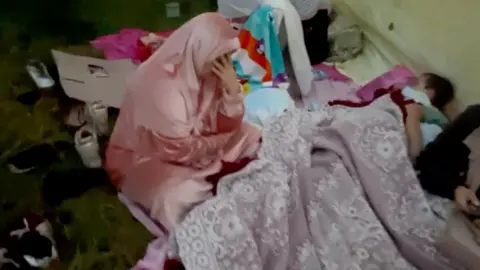
Adnan, his brother and their families slept outside after a warning that their rented apartment would be bombed
In late December, I reported as the Israel Defense Forces (IDF) handed about 80 bodies to the authorities in Gaza. The IDF said it had taken them from Gaza to Israel so they could be checked to see if there were any hostages among them.
A large lorry drove into the cemetery in the Rafah area. The stench was overwhelming when the container was opened. Men in aprons and masks placed the remains, wrapped in blue plastic, in a mass grave dug by an excavator in the sandy ground.
I had never seen a scene like that before. It is hard to describe how horrible it was.
Then, in January, I was reporting from a hospital in Rafah when several bodies were brought in, including another of Wael Al-Dahdouh's sons, Hamza, his eldest, who was also a journalist working for Al Jazeera.
Who would tell Wael? It just seemed impossible, after the tragedies he had already faced. I could not even listen as one of my colleagues called someone close to Wael to pass on the news.
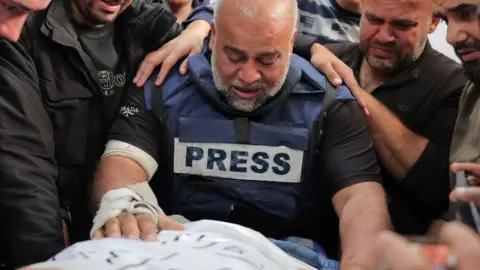
Al Jazeera bureau chief Wael Al-Dahdouh's lost family members in two separate air strikes
Hamza and his colleague, freelance videographer Mustafa Thuraya, were killed in an Israeli air strike on their car, after they had reported on the aftermath of another strike in the area.
The Israeli military alleges they were "were members of Gaza-based terrorist organisations". The families and Al Jazeera reject the claims as false.
The IDF says the two were operating drones "posing an imminent threat to IDF troops", but a Washington Post investigation "found no indications that either man was operating as anything other than a journalist that day".
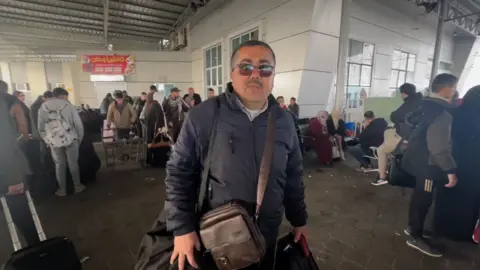
Adnan and the BBC team finally left Gaza in February, unsure when they would return
More than 100 journalists have been killed in Gaza since 7 October, according to Reporters Without Borders - the vast majority are known to be Palestinian.
The IDF says it "has never, and will never, deliberately target journalists".
It says it "takes all operationally feasible measures to mitigate harm to civilians including journalists", but "remaining in an active combat zone has inherent risks".
Eventually, the news came that the BBC team's families had permission to leave Gaza. Four weeks later, we too finally left through the Rafah crossing, facilitated by the Egyptian authorities.
I am writing this in Qatar. But I know that in Jabalia, they have been pulling up grass and grinding animal feed to eat, while I'm here having meals in a clean hotel. I find it hard to eat - it's like eating poison.
The future is a blur. Gaza is my life. I want to return one day, but for now, that seems impossible.













